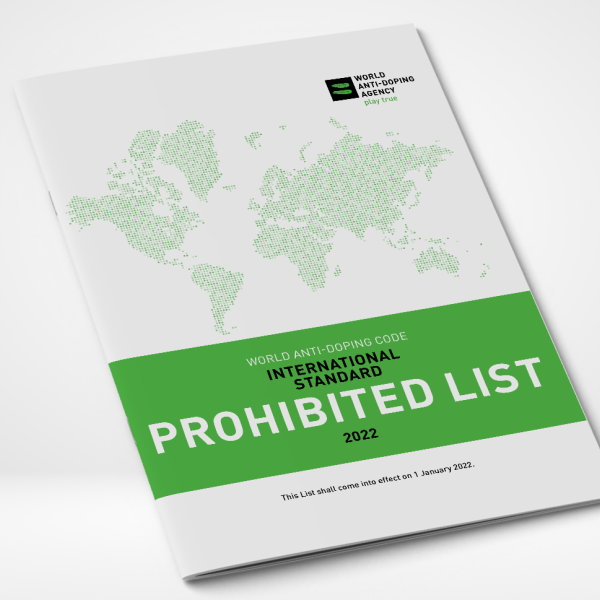Releases
WADA Executive Committee approves Technical Document for innovative dried blood spot testing method

- ExCo also approves new approach for athletes with cases of contamination
- Working Group on Governance Reforms submits its first interim report as progress continues to be made
- Update provided on COVID-19 and its impact on anti-doping
The World Anti-Doping Agency’s (WADA’s) Executive Committee (ExCo) and Foundation Board (Board) met virtually yesterday (20 May) and today (21 May), respectively, to discuss and make a number of decisions on a range of important topics for the Agency and the global fight against doping in sport. These included, in particular, scientific and legal advances in the areas of dried blood spot (DBS) testing and contaminants, WADA’s ongoing governance reforms, as well as the response of the anti-doping community to the challenges raised by COVID-19.
The 38-member Board is WADA’s highest policy-making body. It delegates the management and running of the Agency to the 14-member ExCo. Accordingly, the ExCo takes decisions of its own and makes recommendations to the Board for decisions concerning the performance of certain activities and the administration of assets.
Given the virtual nature of this week’s meetings due to restrictions imposed by COVID-19, decisions stemming from the Board meeting, which was open to the media and observers as per WADA’s Statutes, will be confirmed via a two-week circulatory voting process. This will ensure the integrity of the voting process and mitigate any difficulties that may arise from holding a virtual meeting with such a large group of participants. WADA will then publicly communicate the decisions once they are final. The major decisions taken by the ExCo and the main discussions held by both the ExCo and the Board are outlined below.
Dried Blood Spot Testing
The ExCo unanimously approved an important Technical Document (TD) on the innovative new process of dried blood spot (DBS) testing. This TD harmonizes DBS testing by providing Anti-Doping Organizations (ADOs) and WADA-accredited laboratories with specific requirements and procedures for DBS sample collection, transport, analysis and storage.
WADA, in collaboration with the International Olympic Committee, the International Testing Agency and the National Anti-Doping Organizations of Australia, China, Japan, Switzerland and the USA, has been working since 2019 on the development of this method, which has the potential to make a significant positive impact.
WADA President, Witold Bańka, said: “WADA believes in the potential for dried blood spot analysis to become a very valuable addition to the testing program. It can be used to complement current anti-doping practice, in particular to facilitate the analysis of unstable compounds and to expand on the number of athletes that can be tested in more remote areas of the world from where traditional blood samples are difficult to transport. Given the logistical and cost advantages, DBS will allow testing authorities to target more athletes and collect more samples.”
WADA Senior Executive Director for Science and International Partnerships, Dr. Olivier Rabin, said: “WADA has been leading a collaboration of Anti-Doping Organizations to address all the technical challenges and adapt anti-doping rules to allow for the development of DBS. This partnership builds on research conducted by several Anti-Doping Organizations and laboratories around the world, which I would like to thank. The approval of this Technical Document is an important step toward harmonizing DBS practice within anti-doping. We are aiming to trial certain elements of DBS testing at the Olympic and Paralympic Games in Tokyo this year before rolling it out for routine use at the Games in Beijing early next year.”
The advantages of DBS include:
- Easy sample collection (e.g. finger or upper arm prick);
- Less invasive methods than current urine and blood collection and therefore, a better athlete experience;
- The test requires only a very small volume of blood;
- Less expensive collection and transport of samples;
- Less space needed to store samples; and
- Possible benefits with regards to sample stability.
The TD will come into effect on 1 September 2021 and WADA will assist ADOs and WADA-accredited laboratories around the world with the progressive implementation of this method to make sure that they are ready for its routine use at the Beijing 2022 Games and beyond.
TDs are mandatory documents that complement certain WADA International Standards by providing specific technical recommendations to ADOs and WADA-accredited laboratories.
Minimum Reporting Levels for Contaminants
In another step forward made possible by progress in scientific research, the ExCo unanimously approved recommendations from WADA’s Contaminants Working Group for the approval of Minimum Reporting Levels (MRLs) for diuretics and growth promoters, as the anti-doping community continues to deal with the complex issue of contamination with substances included in WADA’s Prohibited List, particularly as it relates to meat and medications. The ExCo also approved two related Technical Letters, which will come into effect on 1 June 2021 and will allow WADA-accredited laboratories to adjust the levels of selected diuretics and anabolic steroids/growth promoters required to be reported as adverse analytical findings (AAFs) going forward.
The Working Group, which includes international experts in the relevant areas of science and law, was set up in 2019 to follow up on the work that led WADA to provide guidance on the management of clenbuterol cases and to assess the risks of contaminants appearing in natural and unprocessed foodstuffs, in particular with meat in certain regions of the world. The Group was asked to assess the risk associated with legitimate medicines based upon real cases (e.g. diuretics in pain medication) and then recommend some MRLs under which concentrations of those identified contaminants may not be systematically reported by laboratories as AAFs.
Dr. Rabin said: “Inadvertent doping due to the contamination of meat or medication is a very complex issue, especially in light of the ever-growing levels of sensitivity achieved in the detection of prohibited substances by WADA-accredited laboratories. Fairness for athletes is one of the cornerstones of the World Anti-Doping Code and it is right that as science advances, we do our utmost to distinguish between those who have a doping case to answer and those who genuinely carry no responsibility. These Minimum Reporting Levels for contaminants will allow the anti-doping community to better strike that balance and that can only be good for athletes.”
In line with this decision, the ExCo also approved two related Technical Letters (TLs), TL23 and TL24, that implement, at the scientific level, the recommendations made by the Working Group related to contaminants in meat and pharmaceutical products, respectively. TLs are directly related to the International Standard for Laboratories and are classed as mandatory documents.
The Working Group will now continue its work by looking at a number of other selected substances.
WADA Governance Reforms
The ExCo and Board received the first interim report from WADA’s Working Group on Governance Reforms, including the contributions received from stakeholders as part of the first phase of consultation. The Working Group was set up in November 2020 to monitor the effect of the governance reforms approved in 2018, as well as to consult with various stakeholders and propose additional and appropriate reforms going forward. The seven-person Working Group, which is composed of governance experts, includes two athletes and an independent Chair.
Members expressed satisfaction with the work carried out so far by the Working Group and provided guidance to its Chair, Professor Ulrich Haas, for the second part of the group’s work, which includes further stakeholder consultation and the development of specific recommendations for discussion and potential approval by the ExCo and the Board at their November 2021 meetings as planned. To align with these steps, following a recommendation of the Working Group, the ExCo agreed to defer a decision on the matter of establishing a Code of Ethics and forming an independent Ethics Board or similar structure in order to incorporate this discussion as part of the work coordinated by the Working Group.
WADA President, Witold Bańka, said: “WADA believes that a modern, robust governance model is crucial and is fully embracing this ongoing process of reform to ensure our governance evolves together with our global mission for doping-free sport. Enhancing our governance model, increasing our independence and ensuring that athletes remain at the center of everything WADA does is a priority for the Agency. Significant progress has already been made in this area and I look forward to the ExCo and Board receiving more detailed recommendations from the Working Group in the coming months. I thank the members of the Working Group for their interim report and all those who have contributed to the first phase of the consultation. We will continue to collaborate with all our stakeholders to ensure that WADA’s governance model continues to evolve with best practice.”
COVID-19 and Impact on Tokyo 2020
The ExCo and Board received an update on the impact of the COVID-19 pandemic on anti-doping as well as on WADA’s operations for the upcoming Tokyo Olympic and Paralympic Games.
WADA Director General, Olivier Niggli, said: “The anti-doping community has risen to the challenge of the COVID-19 pandemic and is making sure that the system is returning to normal as quickly and safely as possible. Out-of-competition testing is now at a level higher than it was at this time in 2019. WADA is monitoring the integrity of anti-doping testing worldwide in light of the pandemic and continues to provide guidance to anti-doping organizations and athletes on a regular basis.
“While testing is important, as we approach the Olympic and Paralympic Games in Tokyo and the Beijing Games in 2022, the anti-doping community is using other tools that are available to it, namely the Athlete Biological Passport, long-term sample storage, intelligence and investigations and, of course, education that is intended to prevent doping from ever happening in the first place.”
The ExCo and Board heard that WADA was encouraging and supporting ADOs worldwide to use all tools at their disposal and to conduct the best possible anti-doping programs in the build-up to Tokyo. WADA is also supporting the work of the Pre-Games Testing Group, coordinated by the International Testing Agency. This group aims to ensure that all athletes competing at the Games have been subject to a suitable level of testing in the lead-up. In addition, the Agency is working to ensure that the WADA-accredited laboratory in Tokyo will be ready for the challenge that awaits it, and WADA Independent Observer teams will be present in Tokyo to monitor anti-doping activities and ensure that the most effective anti-doping programs are delivered.
Unfortunately, the WADA Outreach Program, which has been a long-standing athlete engagement and awareness-building presence during the Games, will not be present in Tokyo due to the COVID-19 restrictions that will be in place.
Russia
Members received updates about the significant work that is still being conducted by WADA in relation to Russia. This includes in particular the monitoring of the implementation by all World Anti-Doping Code Signatories of the December 2020 decision of the Court of Arbitration for Sport regarding the non-compliance of the Russian Anti-Doping Agency, as well as the follow up of doping cases as part of the Agency’s Operation LIMS related to the data and doping control samples retrieved by WADA from the former Moscow Laboratory.
In particular, WADA continues to provide support when needed to International Sports Federations (IFs) to bring cases forward that may lead to anti-doping rule violations, to monitor IF decisions in relation to evidentiary packages provided to them by WADA, and to appeal decisions when the Agency does not consider them to be in line with the World Anti-Doping Code. In the lead-up to the Tokyo Olympic and Paralympic Games, WADA’s Legal Affairs Department and independent Intelligence and Investigations Department are focusing all their energy to prevent athletes or athlete support personnel who were identified as part of Operation LIMS from participating in the Games.
Standing Committees
The ExCo and Board received reports from the five WADA Standing Committees, namely the Athlete Committee, the Compliance Review Committee, the Education Committee, the Finance and Administration Committee, and the Health, Medical and Research Committee.
Athlete Committee Chair, Ben Sandford, gave an update on progress related to the development of the concept of an athletes’ anti-doping ombuds and of the work conducted by the sub-group of WADA’s Athlete Committee to develop models of athlete representation within WADA’s Athlete Committee and further increase the level of athlete representation within WADA. He also highlighted the work that the Committee was conducting as part of its outreach and athlete engagement work, providing webinars for athletes, including a recent one entitled “2021 COVID-19 and Clean Sport Update” that attracted more than 1,000 athletes and other stakeholders.
Other Decisions
In addition, the ExCo:
- Approved the recommendations of the WADA Education Committee for 18 social science research project grants totaling USD 474,480 under the 2021 Social Science Research Grant Program. In line with WADA’s Social Science Research Strategy, this year’s grant program proactively sought projects that would enable investment in traditionally under-funded geographical regions. The approved projects cover 14 countries across five continents, with 72% of them representing countries outside Western Europe and North America. The details of the newly approved projects will be made available under the Social Science Research section of WADA’s website in due course.
- In accordance with the WADA Investigation Policy, approved the renewal of the appointment for a three-year term of Jacques Antenen, Chief of the Cantonal Police of Vaud, Switzerland, as Independent Supervisor of the Agency’s independent Intelligence and Investigations Department.
- Approved a number of minor amendments to the International Standard for Results Management (ISRM) to ensure its alignment with various Technical Documents and the latest version of the International Standard for Laboratories. The amended version of the ISRM will be published in the coming days.
Next Meetings
The ExCo will meet next on 15 September 2021, in person in Istanbul, Turkey, if restrictions allow, or virtually. The next ExCo and Board meetings are scheduled in November 2021.
Board decisions will be announced once the two-week circulatory voting period has elapsed. In due course, WADA will also publish more detailed information and documents related to the decisions taken by the ExCo that may not have been included in this release.

